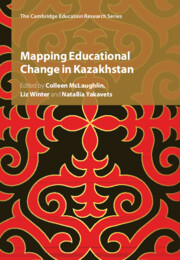Book contents
- Mapping Educational Change in Kazakhstan
- Mapping Educational Change in Kazakhstan
- Copyright page
- Dedication
- Contents
- Figures
- Tables
- Contributors
- Preface
- Acknowledgements
- Introduction
- Part I Foundations of Scaling Up
- Part II Piloting Initiatives and Scaling Up to the Whole System
- 6 Piloting the Renewed Content of Education
- 7 Revising the Content and Standards of Student Assessment
- 8 New Ways of Financing Schools
- 9 Professional Capacity of the Leading Schools as a Managing Mechanism in Updating the Content of Secondary Education in Kazakhstan
- 10 The Teacher Leadership in Kazakhstan Initiative
- 11 Developing Teachers as Researchers
- Part III Evidence of Implementation
- Conclusions
- Select Bibliography: School-Level Educational Reforms in Kazakhstan, 2011–2022
- Index
- References
8 - New Ways of Financing Schools
Per-Capita Funding
from Part II - Piloting Initiatives and Scaling Up to the Whole System
Published online by Cambridge University Press: 09 November 2023
- Mapping Educational Change in Kazakhstan
- Mapping Educational Change in Kazakhstan
- Copyright page
- Dedication
- Contents
- Figures
- Tables
- Contributors
- Preface
- Acknowledgements
- Introduction
- Part I Foundations of Scaling Up
- Part II Piloting Initiatives and Scaling Up to the Whole System
- 6 Piloting the Renewed Content of Education
- 7 Revising the Content and Standards of Student Assessment
- 8 New Ways of Financing Schools
- 9 Professional Capacity of the Leading Schools as a Managing Mechanism in Updating the Content of Secondary Education in Kazakhstan
- 10 The Teacher Leadership in Kazakhstan Initiative
- 11 Developing Teachers as Researchers
- Part III Evidence of Implementation
- Conclusions
- Select Bibliography: School-Level Educational Reforms in Kazakhstan, 2011–2022
- Index
- References
Summary
This chapter examines the policy learning that has taken place during the process of piloting the per-capita funding formula and the school-board governance models in Kazakhstan. It draws on evidence from policy documents, secondary data sources and the primary data from collaborative research by the Nazarbayev University Graduate School of Education (NUGSE) and the University of Cambridge (2019–2020) and the NUGSE research project for 2021–2023 focused on country-wide implementation of per-capita school funding. The chapter describes the process of piloting this funding and documents how school principals perceive this new approach and the new mandated policy of appointing their boards of trustees. This research concludes that the piloting of the per-capita funding model and scaling up this reform affirm the importance of time and an ongoing policy evaluation for enabling policy learning and achieving improved policy outcomes. Hence, every phase of piloting this funding resulted in some new understanding of this model among school principals. In addition, they gained knowledge about the boards of trustees’ role in school improvement.
Keywords
- Type
- Chapter
- Information
- Mapping Educational Change in Kazakhstan , pp. 137 - 150Publisher: Cambridge University PressPrint publication year: 2023

